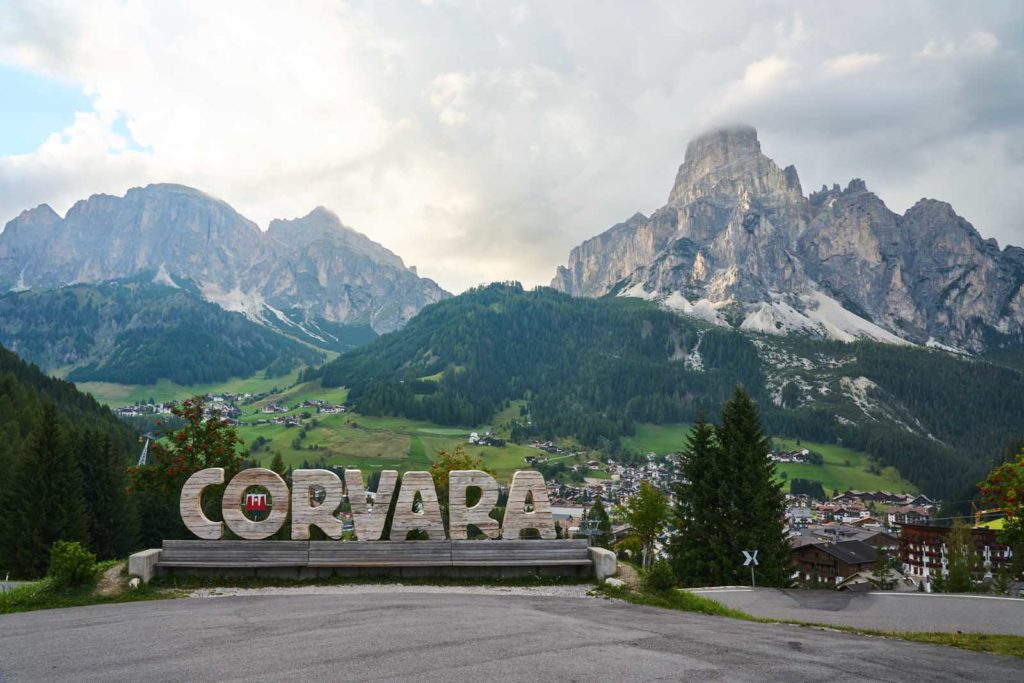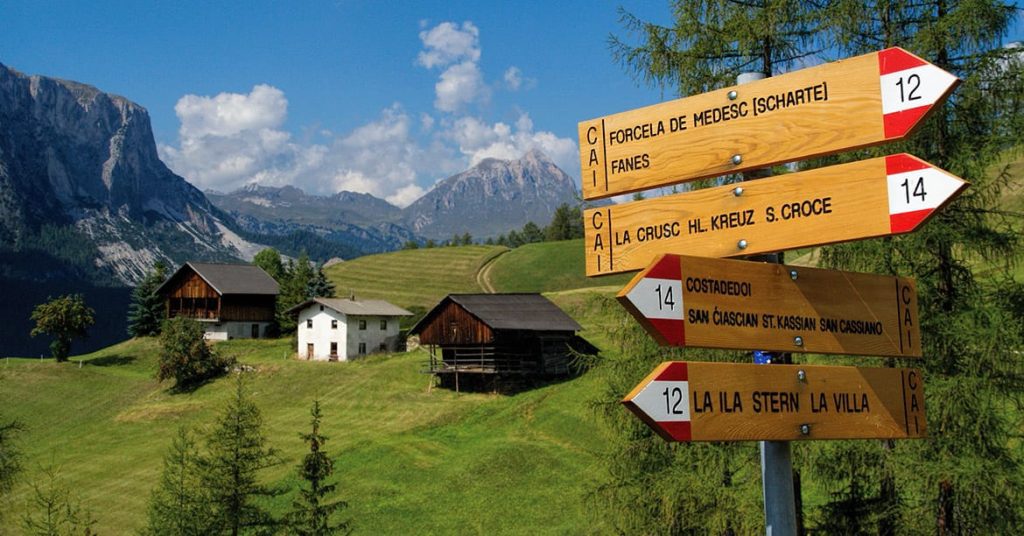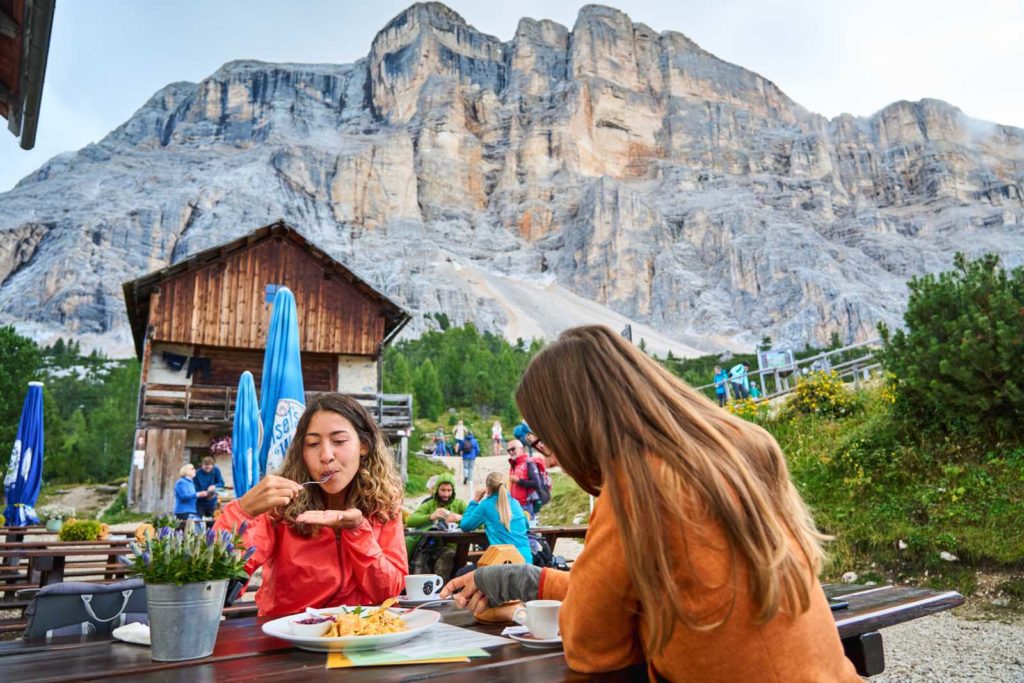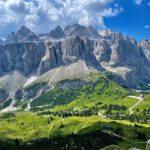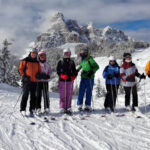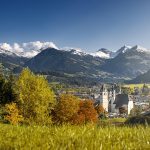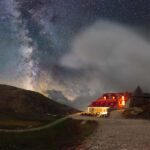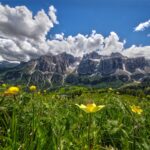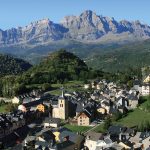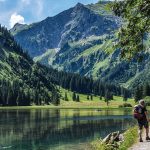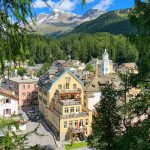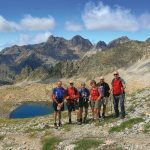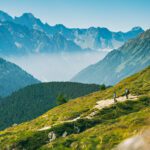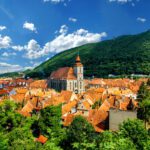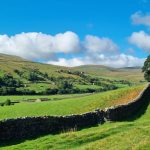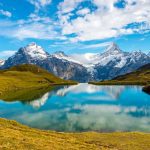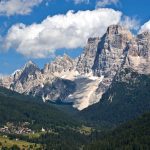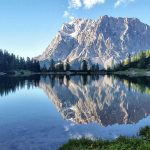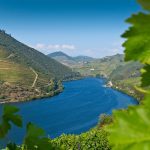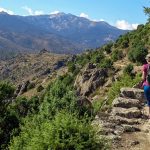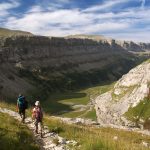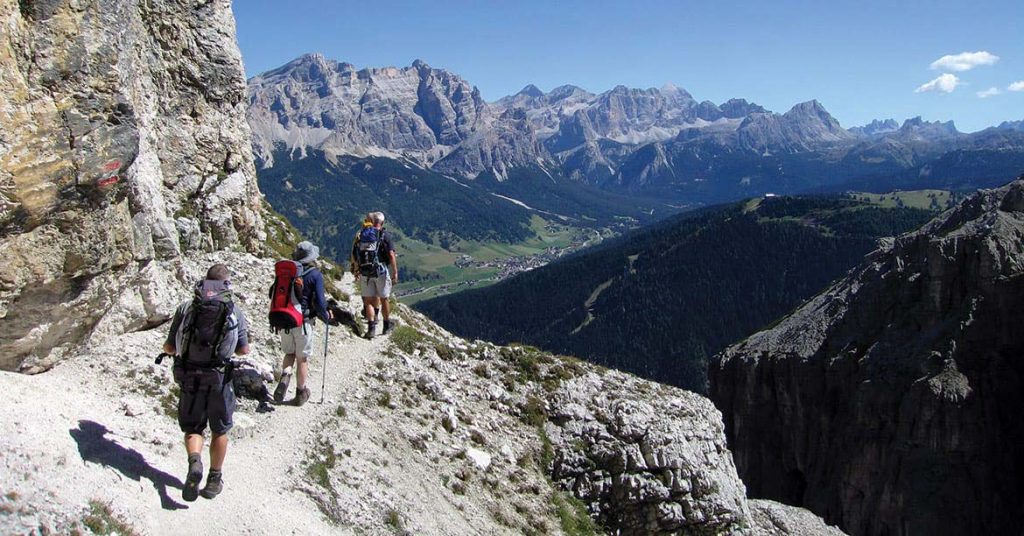
Welcome to the Italian Dolomites
With their explosive shapes and unique colours, the Dolomites are arguably the most stunning mountains in the world. Unquestionably the crown jewels of the Alps, at every turn you are stopped in your tracks by their sheer magnificence. Dolomites walking holidays offer hikers an escape to natural paradise, whether you are a high level trekker, moderate hiker or a dreamy stroller, not to mention flower lover, artist, photographer, Via Ferrata climber or an all-round alpine enthusiast. Or, if you simply seek out an idyllic alpine retreat.
Our centre-based walking holidays in the Dolomites are located in the Alta Badia, one of the prettiest valleys in the Alps, where unspoilt Tyrolean villages enchant you with their timber-rich chalets huddled around picturesque churches in a landscape of wildflower-strewn pastures. Meanwhile, the colossal natural monuments, which are the Dolomites, tower above you like castles of rock, soaring to the sky as if frozen in mid-explosion.
We also offer a large range of hut-to-hut walking holidays in the Dolomites. These point-to-point holidays get you right off the beaten at intermediate and higher levels within the Dolomites, featuring overnight stays in mountain lodges (known as huts or ‘rifugios’), located strategically, perhaps where trails converge, and boasting sensational vistas from their sun terraces. These are self-guided holidays, supported by our Walk Packs, which include comprehensive route notes and maps (and often GPS smartphone navigation too) on a succession of breathtaking walks.
The central Dolomites lie largely in Italy’s northernmost province, the South Tyrol, which borders Austria and Switzerland to the north. To the south are the alluring historical cities of Venice and Verona. Geologists believe they were heaved up by great movements in the earth’s crust 50 million years ago when Europe and Africa collided. Since then the actions of ice and water have carved them into the overwhelming sculptural forms we see today. More recently history has shaped the area. After WWI, the area passed from Austria to Italy. In spite of drastic efforts, Mussolini failed to italianise the region and the area now thrives on the harmonious co-existence of the Austrian and Italian cultures in a region where Latin meets Germanic.
Walking Holidays in the Italian Dolomites
Walking in the Italian Dolomites on a Collett's Holiday

For walkers, we offer a memorable holiday experience in an area with UNESCO World Heritage status. Our base in Corvara (for our centre-based holiday in the Dolomites) provides superb access to beautiful waymarked trails of all grades. We are flanked by two natural parks: the Fanes to the east, stretching dramatically towards Cortina, and by the Puez-Odle to the west, extending equally dramatically to the Val Gardena. To the south we have a monumental natural plinth, Monte Sella (3152m), and our highest peak, the Marmolada (3343m), Queen of the Dolomites.
These majestic massifs host our brilliantly-researched and extensive portfolio of walks. Within our tried and tested gems, there are a handful of must-do classic hikes, but otherwise with Collett’s you will get off the beaten track into special and breathtaking landscapes.
The walks on our hut-to-hut holidays are often more challenging, and perfect for both intermediate and advanced walkers. On these holidays you inevitably negotiate rockier paths as you get higher into the mountains, following trails that lead you to your overnight accommodation in the form of a mountain lodge, where fabulous cuisine and a good night’s sleep await you, not to mention backdrops to die for and an overwhelming sense of peace. All of our hut-to-hut walking holidays in the Dolomites include half-board accomodation, so each stop-over is an opportunity to fuel up on hearty dinners and generous breakfasts.

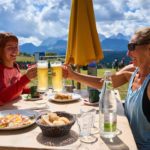
Eating & Drinking in the Dolomites

Alongside the natural splendour of the Dolomites is a culinary tradition that will surely excite the casual foodie and the not-so-casual gourmet too! This is a region that is proud of its gastronomic heritage and, wherever you stay, the food will be a fondly remembered aspect of your time here, especially on our half-board centre-based holidays. Unsurprisingly, the Dolomites has its share of Michelin star-rated restaurants, but wherever you eat, you will be impressed by outstanding dishes at largely affordable prices.
This is also a region of impressive wines, where South Tyrolean vineyards compete with Venetian ones, and the only winner is the holidaymaker! Also, no visit to the Dolomites would be complete without trying the local digestif, which is a schnapps-like tipple called ‘grappa.’
You can read more about our favourite food in the Dolomites, here.
Find out moreCulture - The Timbre of the Tyrol

The South Tyrol became a melting pot of Latin and Germanic cultures when it was transferred to Italy from Austria after WWI. It’s an intriguing mix of flare and efficiency, gathering in the best components of two great countries. Villages and towns are comprised of stunning buildings with window-boxes overflowing with floral colour. Piazzas and streets are beautifully presented, litter-free and immaculately clean. Affluence has reigned since the area’s status of provincial autonomy came into effect in 1991 with 90% of taxes being paid back into the region. It is now the wealthiest province in Italy with tourism replacing agriculture and hydro-electric power as the principal economic activity.
Indeed, these might be the world’s most majestic mountains and valleys, but the success of every holiday in the Dolomites is largely due to the area’s modern mountain-dwelling community, which is reassuringly conservative, yet enlightened. This is a destination where great ideas are built on environmental awareness, hard work and a desire to provide welcoming hospitality in the villages and unforgettable days in the great outdoors.

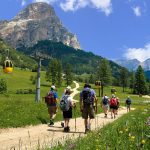
Easy & Moderate Walking in the Dolomites

Here in the magical Dolomites, the intermediate walker and gentle stroller will thrive on the many waymarked paths, which wend their way at low and medium altitude between picturesque hamlets and villages. You can enjoy the spectacular scenery in many different ways, perhaps meandering casually for two or three hours on riverside tracks and through wildflower-strewn meadows, or by venturing a little higher on to the woodland trails, upland pastures and occasionally the lower rocky reaches of the massifs themselves. Many of these routes were originally hunting or smuggling trails.
Welcoming mountain huts, known as rifugios, are dotted around this extensive network of numbered paths, each one with its own sun terrace, on which walkers can soak up their magical surroundings, whilst enjoying well-earned refreshment. Many of these lodges provide overnight accommodation for point-to-point trekkers and they are used regularly to accommodate Collett’s hikers on our hut-to-hut holidays.
Some people come here with their own specific intentions: fossil collectors love the region’s rich geology; artists and photographers try to capture their own visions of these unique mountains; bird and wildlife observers can admire a diverse range of fauna and, whilst spotting a pair of golden eagles is fortunate, sightings of buzzards, chamois, deer and the comical marmots punctuate many lower level walks.
You can read more about walks for beginners in the Dolomites, here.
Find out moreHigh Level Walking
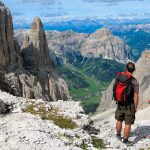
It is hard to think of anywhere in Europe that offers the high level walker such good access to an extensive network of sensational walks on waymarked trails and protected paths. It is all on our doorstep. At every turn, you are exposed to the most mesmerising landscapes, whilst enjoying a choice of routes that suit individual fitness levels.
From Corvara, you can venture on foot into both the Puez Odle and Fanes national parks on walks of a lifetime. Just to the south of Corvara the valley reaches its terminus and here we are towered over by the colossal flanks of Monte Sella, a natural plinth, monumental in size and splendour, where you might easily spend a week without repeating the same walk.
Further afield, yet still within easy access, there is Cristallo (3221m), Tofana (3244m), Lagazuoi & Cinque Torre (2800m) with its World War Tunnels and Open-air WWI Museum and, of course, the Marmolada (3343m), Queen of the Dolomites, with its brilliant white glacier dominating many a panorama. The rifugios are a positive part of high level walking in the Dolomites, and used on the majority of our hut-to-hut walking holidays. The welcome is warm and the food, service and refreshment are excellent and affordable. The views from their panoramic sun terraces are awe-inspiring.
You can read more about the most challenging hikes in the Dolomites, here
Find out more
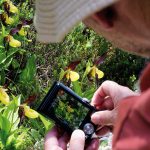
Wildflowers

Like all our destinations, the Italian Dolomites is world-renowned for alpine flora, providing good access to celebrated sites, such as the Pordoi Pass, the Bindelweg and the Vallunga. The period between early June and mid-July is probably the best time for walkers to appreciate the explosion of colour that represents the main flower season. Also, local farming families are not permitted to cut the meadows until mid/late July. Thereafter, they will cut the meadows on two further occasions.
It is one of life’s great pleasures to walk in breathtaking landscapes that are so rich in fascinating flower habitats, where classic and rare species flourish. Over the years we have documented the locations of the sought-after species and this invaluable knowledge grows each year, providing so much pleasure for our flower enthusiasts.
When to Visit the Dolomites
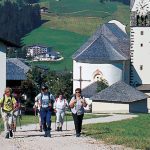
Our summer season of walking in the Dolomites runs from mid June to mid September. People who visit us in June and July will witness the explosion of colour that characterises the the phenomenal flower season. They will marvel at snow-capped peaks and see waterfalls at their most gushing. Alpine flora thrives in its own way throughout the season, but after mid July, you just have to get a bit higher to appreciate it. In June you can’t miss it. Exquisite flowers grow everywhere, from roadside verges to high rocky crags.
Typically, the area livens up and dies down as the season unfolds. June is early in terms of tourism and sometimes we can venture out on a walk and not see anyone all day. It’s almost like having exclusivity to your own mountain paradise. After 20 June, we move into a mid-season atmosphere as local services intensify a little and more local shops open.
You can read our full blog post on the best times of year to walk in the Dolomites, here.
Find out more
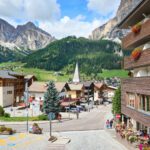
Corvara

For a walking holiday in the Dolomites, Corvara takes some beating because strategically it is the best located village in the South Tyrol’s prettiest valley. Over the years it has been a genuine pleasure to watch the reaction of our guests as they arrive and are immediately awe-struck by their surroundings. Unsurprisingly, the area acquired UNESCO World Heritage status in 2009. The valley wends its way below majestic peaks to Monte Sella (3152m), a glorious and colossal plinth, which typifies the drama of Corvara’s location with magnificent rock formations looming over wildflower-strewn pastures, woodland and sleepy hamlets, where the window boxes of old farmhouses overflow with colour.
Corvara is the principal village of the Alta Badia and has two gondolas, one to the Pralongià Plateau at 1980m for easier and moderate walks, the other to the eastern turrets of the Sella at 2152m for amazing high level walks and also two Via Ferrata. It is a vibrant mountain resort with some delightful cafes and bars, stylish shops and a good range of locally-supplied alpine activities including sport climbing, a climbing wall, high ropes, skating, a swimming lake, golf, tennis, archery etc. It is also close to some absorbing places of interest. In short, whatever you choose to do, you’ll soon be glad you came.
Why Book With Collett's?
Unforgettable Walks
With You Every Step
Hand-Picked Hotels With Warm Hospitality
Mountain Holiday Specialists Since 1997

